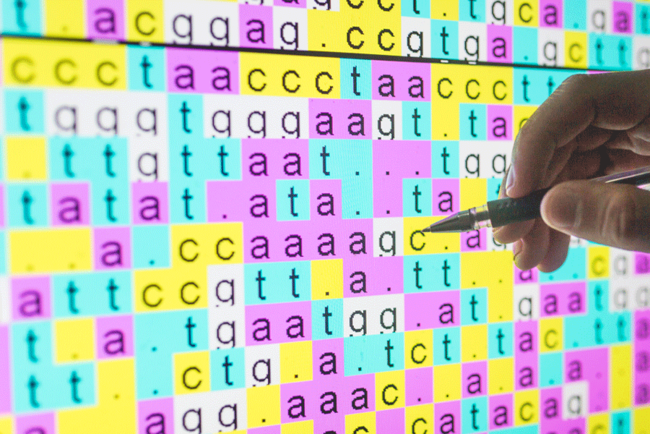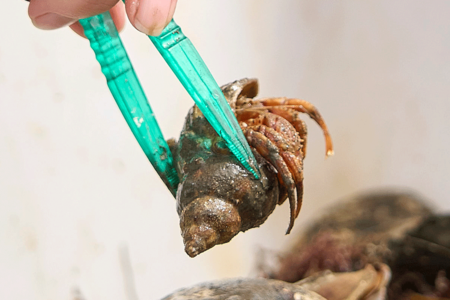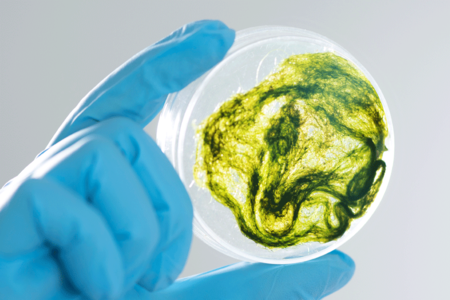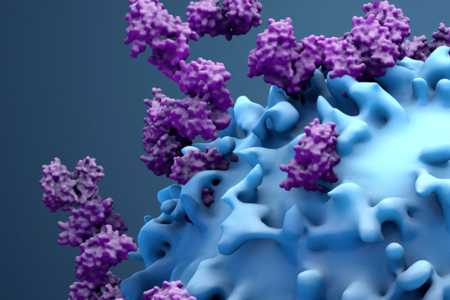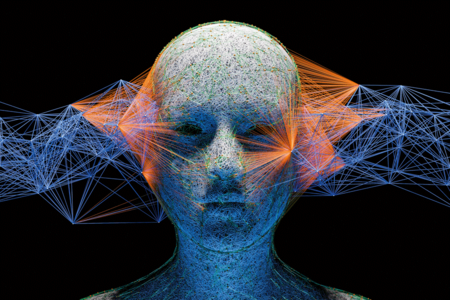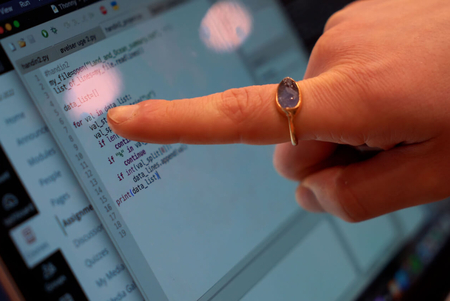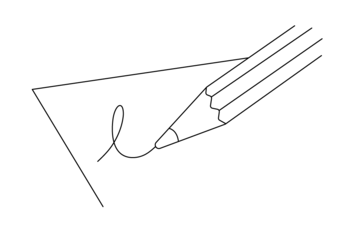About the programme
As a student in Bioinformatics you learn to solve biological problems by combining mathematical and statistical calculation methods with computer science.
You will learn the fundamentals of bioinformatics, which include sequence analysis, protein and RNA structural analysis, genomics, phylogenetics, analysis of high-throughput data, and machine learning methods.
The programme is offered in English.
What makes the programme at UCPH unique?
The master’s programme in Bioinformatics at UCPH offers a unique fusion of biology, data science, and statistics. Students can focus on a broad range of topics, from state-of-the-art method development to application to complex data.Why is this programme relevant?
Bioinformatics are essential to modern biology and medicine. As a graduate, you can contribute to areas such as precision medicine, pharmaceutical research, and data analysis in all areas that relate to biology. Your skills are in high demand in academia and the private sector.Considering studying at UCPH this September?
Apply by 15 January if you are an applicant from outside the EU/EEA/Switzerland. Apply by 1 March if you are from the EUAdmission and application
To apply for admission to this master's degree programme, you must have completed a qualifying bachelor’s degree or a similar Danish or international degree programme which is assessed to be relevant. Apply for admission via the application portal.
Below, you can read more about admission requirements and which documents to upload in the application portal.
Academic admission requirements
Here you'll find the different academic requirements depending on which qualifying degree you hold.
You meet all academic requirements if you hold one of the degrees listed below. Learn about when and how to apply. Note, however, that you still need to document that you meet the programme's language requirements.
From University of Copenhagen
- Biology (biologi) with a specialisation in Bioinformatics
- Biochemistry (biokemi) with a specialisation in Bioinformatics
- Computer Science (datalogi)
- Machine Learning and Data Science (machine learning og datavidenskab)
- Physics (fysik)
Applicants with a Bachelor's degree, Professional Bachelor’s degree or equivalent from Danish or international universities other than those listed above are qualified for admission to the MSc Programme in Bioinformatics if the programme includes the following:
- Courses in basic mathematics of at least 5 ECTS
- Courses in biology, molecular biology, genetics and biochemistry corresponding to a minimum of 30 ECTS and programming or basic computer science courses of at least 5 ECTS with a focus on practical programming skills.
or
- Courses in statistics, computer science, mathematics and physics corresponding to a minimum of 30 ECTS and programming or basic computer science courses of at least 5 ECTS with a focus on practical programming skills.
For informational purpose
Bachelor’s degrees that have previously been assessed as qualifying meeting the specified ECTS: Applicants with a Bachelor’s degree in Biology (biologi), Biochemistry (biokemi), Biotechnology (bioteknologi), Mathematics (matematik), Molecular Biomedicine (molekylær biomedicin) or Natural Science and IT (naturvidenskab og IT) from University of Copenhagen are qualified for admission if the programme includes the following:
- Programming or basic computer science courses of at least 5 ECTS with a focus on practical programming skills.
The following requirements are valid if you apply for admission to the programme in the next application round starting from 15 November 2026 (Non-EU applicants) or 15 January 2027 (EU-applicants):
Legal right of admission
With a Bachelor's degree in
- Bioinformatics (bioinformatik) from University of Copenhagen
you are granted reserved access and guaranteed a place on the Master’s programme in Bioinformatics if you apply in time to begin within 3 years of the completion of your Bachelor’s degree.
Bachelor programmes that fulfil the academic requirements
Applicants with one of the following Bachelor’s degrees automatically fulfil the academic requirements for admission to the MSc Programme in Bioinformatics:
- Bioinformatics (bioinformatik) from University of Copenhagen (legal right of admission)
Other Danish or international education
Applicants with a Bachelor's degree, Professional Bachelor’s degree or equivalent from Danish or international universities are qualified for admission to the MSc Programme in Bioinformatics if the programme includes the following:
- Courses in basic mathematics of at least 10 ECTS
- Courses in biology, molecular biology, genetics and biochemistry corresponding to a minimum of 10 ECTS
- Programming courses of at least 5 ECTS
- Bioinformatics courses of at least 10 ECTS
- Machine Learning courses of at least 5 ECTS
Language requirements
You are required to document that you fulfil the language requirement English B, unless you have a legal right of admission to the programme you are applying for.
Please note that you must have the documentation ready by the application deadline.
Application deadlines
Study start in September
1 March at 23:59
Application deadline for Danish applicants and applicants from within the EU, EEA and Switzerland.
Open for applications from 16 January. You will receive a reply by 10 June.
15 January at 23:59
Application deadline for applicants from outside the EU, EEA and Switzerland.
Open for applications from 15 November. You will receive a reply by 13 March.
How to apply
Choose the category below that fits you and read more about how to apply for admission. You will also find information about application deadlines and documentation on the websites.
Citizen in Denmark, EU EEA or Switzerland
Bachelor’s degree from Denmark
International bachelor’s degree
Citizen in a country outside EU, EEA or Switzerland
Bachelor’s degree from Denmark
International bachelor’s degree
Prioritisation of applicants
If the number of qualified applicants to the programme exceeds the number of places available, applicants will be prioritised according to the following criteria:
- Total number of ECTS credits in courses relevant for bioinformatics.
Limitation on second degrees
If you have already completed a Master's degree, please check out the rules concerning a second degree.
New prioritization criteria for the academic year 2027/28
The following prioritization is valid if you apply for admission to the programme in the next application round starting from 15 November 2026 (Non-EU applicants) or 15 January 2027 (EU-applicants):
If the number of qualified applicants to the programme exceeds the number of places available, applicants will be prioritised according to the following criteria:
- Total number of ECTS in courses relevant* for bioinformatics.
- Grades in relevant courses*
- Grade-point average achieved in their qualifying Bachelor’s degree
*Relevant courses include courses in big data in biology, bioinformatics algorithms, genomics, metagenomics, pharmacogenomics, protein design, protein structural modelling, sequence analysis, structural bioinformatics and transcriptomics.
| Admission statistics Bioinformatics 2025 | |
|---|---|
| Admitted (of which have start in February) | 54 (1) |
| Admission distribution (legal right/other) | 0% / 100% |
| Applicants | 387 |
| Age average | 24 |
| Nationality (dk/international) | 9% / 91% |
Programme structure
Bioinformatics is a two-year MSc programme equivalent to 120 ECTS. You can choose to specialise either in the fields of Computational Biology or Computer Science. Please read about each specialisation further down this page.
Regardless of which specialisation you choose, you will follow three types of courses during the programme:
- Compulsory courses which cover the basic elements of bioinformatics. The courses are mainly placed in the first year of the programme.
- Restricted elective courses – these are courses you choose from a list.
- Elective courses – here you are free to choose MSc or BSc courses at University of Copenhagen. You can also do a Project in Practice or a project outside the course scope.
Do a Project in Practice or Study Abroad
You can use some of your elective courses to do a Project in Practice in collaboration with a company or an organisation. You can also choose to study abroad as part of your programme. Read more here:
Specialisations
Before starting at the Bioinformatics programme, you must choose the particular field of study you wish to focus on. You can read about the programme's two specialisations below:
If you choose the specialisation in Computational Biology, your academic focus will be on biological sequence analysis, molecular phylogeny, structural bioinformatics, systems biology, and the bioinformatics aspects of gene expression and proteomics data.
You will work with the computer software used within the field of bioinformatics and you gain deep insight into subject areas such as genetics, molecular biology, cell biology, mathematics, statistics, computer science, and machine learning. Furthermore, you gain an understanding of the way these subject areas are part of modern scientific practice and of their industrial and medical applications.
Programme Overview
Compulsory courses: 37.5 ECTS
Restricted elective courses: 37.5 ECTS
Elective courses: 15 ECTS
Master's thesis: 30 ECTS
One block each year equals nine weeks of study and 15 ECTS. The table is primarily for guidance and may be subject to revision.
Year 1
| Block 1 | Block 2 | Block 3 | Block 4 |
|---|---|---|---|
| Restricted elective course | Statistics for Bioinformatics and eScience | Population Genetics | Restricted elective course |
| Biological Sequence Analysis | Structural Bioinformatics | Restricted elective course | Data Science for Genomics |
Year 2
| Block 1 | Block 2 | Block 3 | Block 4 |
|---|---|---|---|
| Restricted elective course | Restricted elective course | Thesis | |
| Elective course | Elective course | ||
Restricted Elective Courses
Choose your restricted elective courses from the list below. Click on each course for a detailed description.
- Advanced Algorithms and Data Structures
- Advanced Bioinformatics for Next-Generation Sequencing
- Advanced Topics in Machine Learning
- Applied Programming
- Computational Geometry
- Data Parallel Programming
- Introduction to Data Science
- Machine Learning A
- Medical Image Analysis
- Molecular Biology for Non-life Scientists
- Numerical Optimisation
- Programming Massively Parallel Hardware
- Randomised Algorithms
- RNA Biology
- Bioinformatics Project 1
- Bioinformatics Project 2
- Bioinformatics Project 3
- Bioinformatics Project 4
- Individual Project in Bioinformatics
This specialisation allows you to focus on computer programming e.g., the development and use of algorithms, machine learning, and probabilistic models in bioinformatics.
You gain insight into subject areas such as biological sequence analysis, molecular phylogeny, structural bioinformatics, systems biology, and the bioinformatics aspects of gene expression and proteomics data. Furthermore, you gain an understanding of the way these subject areas are part of modern scientific practice and of their industrial and medical applications.
Programme Overview
Compulsory courses: 37.5 ECTS
Restricted elective courses: 37.5 ECTS
Elective courses: 15 ECTS
Master's thesis: 30 ECTS
One block each year equals nine weeks of study and 15 ECTS. The table is primarily for guidance and may be subject to revision.
Year 1
| Block 1 | Block 2 | Block 3 | Block 4 |
|---|---|---|---|
| Machine Learning A | Molecular Biology for Non-Life Scientists | Restricted elective course | Restricted elective course |
| Biological Sequence Analysis | Structural Bioinformatics | Restricted elective course | Restricted elective course |
Year 2
| Block 1 | Block 2 | Block 3 | Block 4 |
|---|---|---|---|
| Restricted elective course | Advanced Algorithms and Data Structures | Thesis | |
| Elective course | Elective course | ||
Restricted Elective Courses
Choose your restricted elective courses from the list below. Click on each course for a detailed description.
- Advanced Bioinformatics for Next-Generation Sequencing
- Advanced Topics in Machine Learning
- Applied Programming
- Computational Geometry
- Data Parallel Programming
- Data Science for Genomics
- Discrete Optimisation
- Medical Image Analysis
- Numerical Optimisation
- Population Genetics
- Programming Massively Parallel Hardware
- Randomised Algorithms
- Statistics for Bioinformatics and eScience
- RNA Biology
- Bioinformatics Project 1
- Bioinformatics Project 2
- Bioinformatics Project 3
- Bioinformatics Project 4
- Individual Project in Bioinformatics
Programme Curriculum
If you are more interested in the academic content, regulations, and examination requirements, you should consult the curriculum, which serves as the legal foundation for the programme.
There is both a curriculum specific to each degree programme and a general curriculum that applies across the faculty.
Please note that curricula are often revised annually. Any new versions will be published no later than during the spring semester.
Video: Rachael and Malte talk about the study programme in Bioinformatics
Career opportunities
Upon completion of the master’s programme, you will obtain the title Master of Science in Bioinformatics.
You will learn the fundamentals of bioinformatics, which include sequence analysis, protein and RNA structural analysis, genomics, phylogenetics, analysis of high-throughput data, machine learning methods etc.
Only one third of the courses are compulsory, so you will have plenty of opportunity to specialise in your favourite topic through elective courses, small research projects and, of course, your thesis work.
Competence Description
- You will learn to control situations at work and in developments that are complex, unpredictable and require new solutions
- You will learn to individually initiate and complete collaborations and take professional responsibility
- You will learn to find, extract, interpret and evaluate large dataset in complex biological processes
- You will learn to individually take responsibility for your own scientific evolution and specialization
Employment
Many MSc graduates in bioinformatics find employment in biotech companies. A lot of our graduates so far have continued on to a PhD programme.
Student life
High quality education in English, a flexible study structure, excellent facilities, an international study environment, attractive and green campus areas, and the opportunity to experience life in Copenhagen, the cool capital of Denmark. These are some of the qualities about studying at Faculty of Science (SCIENCE) at University of Copenhagen that you can expect.
Throughout the year, various social activities are arranged for all SCIENCE students and for international students specifically. These activities include:
- Introduction Days for new students
- A welcome programme for international students
- International dinners, courses, and lectures
- Sports activities such as fun runs or bicycle races
- Career workshops
Students live in residence halls outside campus or share a flat in the Copenhagen area. You will find that the relatively small size of Copenhagen makes it easy to get around, even by bike.
Where Will I be Studying?
The Bioinformatics programme is primarily based at North Campus.
The University’s North Campus is centrally located. It is home to scientific, pharmaceutical and health science research, and neighbour to the Copenhagen University Hospital (Rigshospitalet), Metropolitan University College, and Fælledparken.
Exciting building activities are going on at the campus areas at the moment, including the construction of a new Natural History Museum. Furthermore, North Campus is part of a coherent district of science, health and interdisciplinarity – Innovation District Copenhagen – which is being developed these years.
You can read more about campus life at the university here:
Here you will find some useful links and videos about student life and housing in Copenhagen, and the welcome programme for international students at Faculty of Science.
- Information about living in Copenhagen – plus practical information on housing, civil registration number, residence permit and more
- General information on student life and studying at University of Copenhagen
- Housing Foundation Copenhagen is an independent entity which assists international students and researchers at University of Copenhagen in finding accommodation. Visit Housing Foundation Copenhagen here
Video: Study Science at University of Copenhagen
Meet Elizabeth and Alex who study at the University of Copenhagen in Denmark. See what it is like to live and study in Denmark.
Video: SCIENCE Welcome Programme
The SCIENCE Welcome Programme is a great way for international students to be introduced to the Faculty of Science at the University of Copenhagen.
Testimonials
Read interviews with students and graduates from the Master of Science programme (MSc) in Bioinformatics.
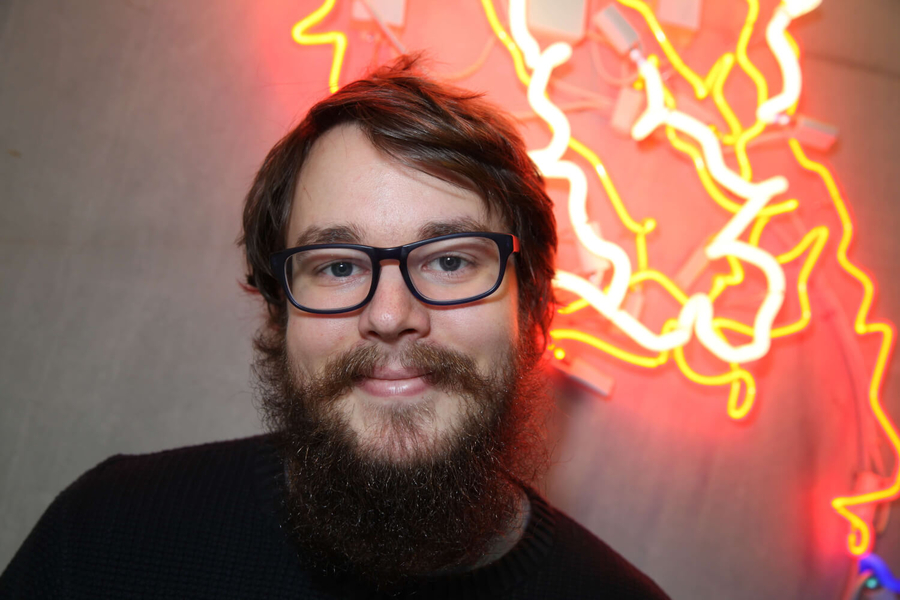
When I applied to study Law, I was after a degree that would bring me prestige and a high salary. But these are completely the wrong reasons for choosing a degree programme.
I was very unmotivated, and felt like law was a very bad fit. Something had to happen, and there’s no point switching to another degree programme unless the change is big enough to make a real difference, so I applied for Bioinformatics.
What is bioinformatics?
You could say it’s about the statistical analysis of large volumes of biological data. For example, when sequencing DNA. When you sequence, you look at how the base pairs are arranged in a DNA strand. This is what defines us genetically.
Sequencing generates a huge amount of information. In Copenhagen alone, 2-3 terabytes of this type of data are produced every day. This corresponds to what you can store on the hard drives of about six standard Mac Books! How do you navigate all this?
This is where biology comes into it, because it’s important to ask the right questions, and biologists are good at that. However, they don’t know much about how to analyse all the data. Computer scientists, on the other hand, are really good at this, so the programme is trying to combine the two disciplines. In other words, it’s mix of computer science – i.e. mathematics and statistics – and biology courses.
What can it be used for?
We can, for example, gain new knowledge about diseases and infections by comparing DNA in large groups of sick and healthy people.
Do you do a lot of mathematics?
Quite a lot, and it can be daunting. But I failed mathematics in upper secondary school, and when I started here I hadn’t done mathematics for nine years, yet I could still keep up. The focus here is not on performing mathematical proofs, but on thinking logically. You learn to program, and that helps you understand mathematical formulas. So people should not be scared by the mathematics.
It’s also possible to do elective subjects with more emphasis on biology. You can basically choose to emphasise the tools – the mathematics and statistics, or learning to ask the right questions – the biology.
It sounds like you spend a lot of time using computers?
The computer is our most important tool each day. We see the computer as a toolbox that you learn to program. This is clearly the most important thing I’ve learned in all my years at university. I don’t understand why everyone doesn’t get taught this during the first year of their degree programme. It makes everything much easier.
What kind of jobs can you get when you are finished?
There are a lot of research-based jobs. The graduates I have spoken to typically work as PhD students or research assistants.
In the private sector, Bioinformatics graduates are typically employed in biotech departments. In Denmark, the medico sector is still only slowly opening up. I think they have been accustomed to pharmacists, who are well educated here in Denmark. But employers are starting to notice this programme, and companies that employ Bioinformatics graduates are happy with them – so the graduates say.
What is your dream job?
I dream of doing a PhD, ideally in Japan. I want to work with machine learning, i.e. programming that makes computers recognise patterns.
An example: you take a group of people with a particular type of cancer and a group without. You sequence their DNA and ask the computer to find the differences between the sick and the healthy. The aim is to teach the machine how to work out whether people are at risk of developing cancer.
What do you think about the study environment?
It’s great, and this was really important for me when I chose the programme. Every other Friday, people can meet up at a study café, where you can get a cup of coffee or a soft drink and play board games. A mix of students, professors and other employees come along, so you can have a chat about how things are going.
The programme involves a lot of group work and cooperation, so you can get good help from your fellow students. I’ve often sat here with other students until around 9:00 or 10:00 in the evening, working on various projects.
Not many students know each other from their bachelor’s programme, so there are no cliques when you start the programme. About 50% are international students, and they are keen to make friends.
Do you have any tips for anyone interested in applying to do Bioinformatics?
Don’t be intimidated by the mathematics and things you don’t know. Let go a little of the expectation that you have to understand everything all the time. Sometimes, you have to accept there are things you don’t understand. Over time you will have regular AHA experiences. Enjoy these AHA moments – they are really fantastic.
After graduation, Christian has worked as a Software Engineer at various companies.
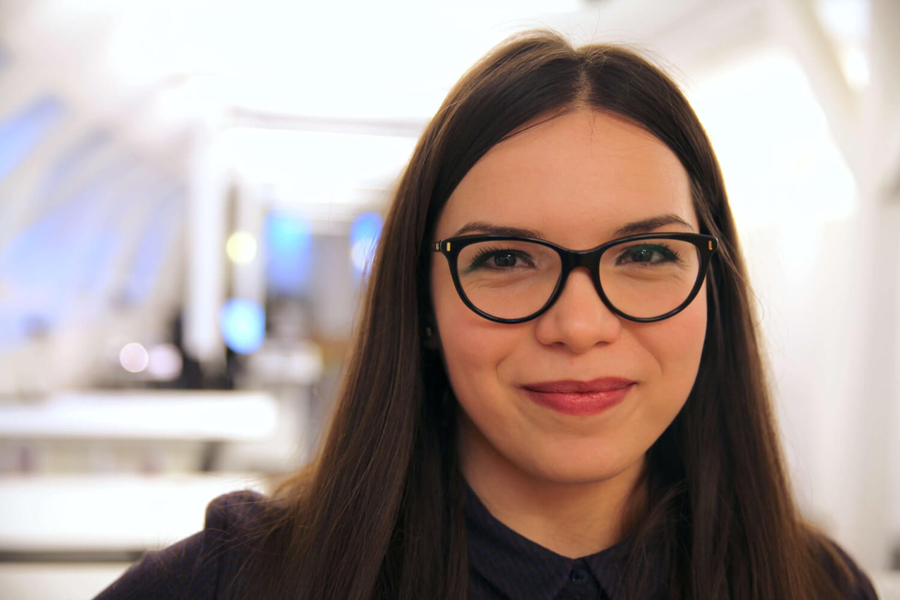
Why did you choose bioinformatics?
I was extremely curious about the emerging field of bioinformatics and the increasing volume of biological and experimental data that needed to be mined. The opportunity to get a better understanding of how the human body functions at the molecular level and how it responds to different external factors, by carrying your own analyses, was compelling.
Why did you choose University of Copenhagen?
I discovered University of Copenhagen, the Bioinformatics MSc programme there and the excellent educational rankings. At that point I knew exactly where I wanted to go and was extremely happy when I got accepted for the session starting in 2010.
What was your thesis about – and when did you finish?
My thesis was entitled “Discovery of miR signatures and possible therapeutic targets for the treatment of cardiovascular diseases” there.
In brief, I compared the performance of different statistical methods on mining biological data reflecting the strength of a microRNA molecule in changing gene expression, with a focus on cardiovascular diseases.
Today you are working for Agnitio*. What is your job?
At Agnitio, our customers collect data in a marketing campaign – using our software tool – we store and manage it, and then report and analyse it for the Marketing and Brand managers and other interested parties. The new digital marketing materials will be designed in a way that targets the audience better. The end point of using the collected data with our platform is to give the health care professionals a personalised experience when it comes to digital communication.
I am responsible for managing the reporting environment, data modelling and integration, specifying, implementing, and delivering the analytics solutions to our clients. I am also managing a team of junior analysts – students from the IT University of Copenhagen, University of Copenhagen, and Technical University of Denmark studying IT, mathematics, natural language processing and data mining.
Did the education give you the qualifications you need to meet the challenges in your job?
Surely. When I started my master’s, my knowledge in biology, which is crucial for this programme, was quite limited. Thus, besides the quantitative skills and applying analytical methods to real world problems, my education taught me how to learn new skills rapidly and transfer business and academic requirements into working solutions.
On the other hand, I think that there are many other things that you can only learn at the job and no education can make you fully prepared for that.
Was it hard for you to get a job?
I think I have been extremely lucky with finding a job here. I worked as a Bioinformatician at Herlev Hospital and managed to get the job relatively easy three months after graduation.
For my current position, I have been recruited via LinkedIn, while I was still employed at the hospital.
Which kind of jobs can one get?
A few of my colleagues are currently enrolled in PhD programmes, others are doing software development and/or data analysis or have managed to find bioinformatics positions at research centres and are considering doing a PhD after all.
The great thing with bioinformatics is that you acquire a variety of skills which in my opinion increase one’s chances of getting a job, compared to other study programmes.
Any tips for future students?
If you do not have the skills, you should invest energy in courses on scientific communication (writing and speaking). Most of the exams from the science programmes at University of Copenhagen are written scientific reports with oral defence. It is crucial to be able to communicate your results and implications clearly.
And for the international students: Don’t think that you’ll find accommodation as easy as you would in your home country and don’t count on the student accommodation options as the waiting lists are very long. Look for places ahead of time if possible.
When things are so new at many levels, one might feel overwhelmed. The overall experience however, will be totally worth it.
*Since this interview, Andra has moved on to become Director of Engineering at Storytel in Denmark.

What’s your background?
I have a bachelor in Mathematics from Aristotele University in Thessaloniki. That’s a four-year study in Greece. I did mostly theoretical maths.
But now you have changed direction. Why?
I was thinking of continuing and doing my master in theoretical maths. But because of the lack of jobs in this area, I looked at other possibilities like economics or statistics.
While I was searching, I started reading about bioinformatics. In Greece it’s not a popular field yet, although they have started up something along the same lines in Athens. I found it very interesting, because it’s a combination of maths, computer science and biology.
Did you have any special interest in biology?
I always had an interest for natural science. I didn’t have a special interest in biology, but I have always wanted to work to improve human health and quality of life. So I found Bioinformatics a good way to achieve this goal.
What exactly does a bioinformatician do?
There’s a big variation in the field. Bioinformaticians can work with the structure of proteins, whole genome analysis, population genetics, ect. To analyse data and create tools for data-analysis – that’s the main thing we do.
So bioinformaticians usually work together with researchers from other fields?
Yes, it’s very common to work with either doctors or labs providing the data and then we have to analyse it and hopefully discover something useful.
But Bioinformatics is also about building tools. If you analyse data, you can use already built tools or you can build your own – or both. It depends on your skills, your interests and what you want to do. Actually, I’ve heard recently that a lot of hospitals need bioinformaticians here in Denmark.
What’s your thesis going to be?
Eh, it’s a bit too technical to explain fully, haha. I’m working with RNA and proteins. I am trying to find correlations between specific proteins and some properties of the structure of RNA.
What do you want to do when you finish your master?
I would like to be a researcher. I think it’s an interesting job because you always do something new and have to read and study all the time. Generally, I would prefer to get a job at a university, but I wouldn’t say no to a job in the private sector. Especially here in Denmark I think the private sector is very good. And of course private companies often have more money than the universities, so in that sense it can be more attractive.
What is your experience of the university and studying here?
For me it’s been good. First of all, I didn’t know that you are so informal here. You are on first name terms with the professor. In Greece, you call them Mr. professor and then their surname. You don’t even know their first name. The first day in the class, I heard the Danish students call the professor Anders. I guessed it was some kind of title. It took me some time to understand it was his first name, haha …
The professors are so open. That was a great surprise to me. They get involved in your projects and you can discuss with them. For me, those things were almost unbelievable.
What was it like going from being a bachelor to being a master student?
It was very hard and it required a lot of studying. Before I started my masters here, I didn’t even know how to use a computer properly, except for Facebook, mails and browsing. The difference after a year was very big.
Of course in the first couple of months I was quite lost, because the teaching is in English and my English wasn’t so good. I had only used Greek books in my studies, so it was a big difference. Things here seem to move very fast. Faster than I was used to. Education here is more about critical thinking and not about memorising, so it was quite different compared to what I was used to.
I also didn’t have any experience with oral exams or with group work – so everything was new. But you can always ask help from your fellow students.
One difficulty is that it’s not easy to make friends with the Danes or to approach them. Either I don’t know how to do it or they are not so open. In the master’s programme, it’s mostly the internationals forming a group separate from the Danes. If I could change something here, it would be to make the Danes a bit more open.
In the beginning everything was strange to me, but when you start to understand, it becomes easier. At first I thought the Danes were very rude. But now I understand that this is their way, and they don’t just do it to me – they are also doing it between themselves. A lot of times they say things to you that I wouldn’t say to anyone.
For instance … in the beginning I was always using the elevator. One day I just entered the building and ran because the door of the elevator was almost closing. There was a Danish lady in the elevator who looked at me and said “If you’ve got so much energy to run, you should take the stairs instead.”
I thought it was so rude, but she was only joking. And now I always take the stairs… hahaha …
Evdoxia now holds a PhD from Aarhus University and is currently working as a postdoctoral researcher at University of Copenhagen.
Contact student guidance
Questions about study choice and admission
Our student guidance are ready to assist you with answers to your questions about:
- application procedure and the digital application portal
- admission- and language requirements
- documentation
- study life
- career opportunities
- study choice or doubts
Did you not find what you were looking for?
You can find answers to questions most often asked by potential students in the FAQ. Read the FAQ
Questions about the digital application-portal?
Do you have questions about digital application? Check our user guide to the application portal.
In case of technical problems, please contact the IT-support by
- Mail: it-service@adm.ku.dk // Tel: +45 35 32 32 32
Location
- North Campus, Ole Maaløes Vej 5, DK-2200 København N.
